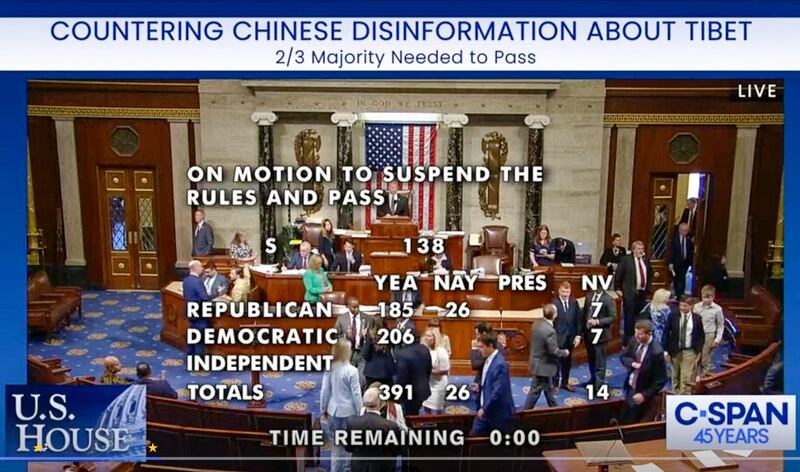President Joe Biden on Friday signed into law a bill that urges China to resume talks with the Dalai Lama or his representatives to arrive at a “negotiated agreement on Tibet” as he reiterated that the measure did not represent a change in U.S. policy.
"I share the Congress's bipartisan commitment to advancing the human rights of Tibetans and supporting efforts to preserve their distinct linguistic, cultural and religious heritage," Biden said in a July 12 statement.
The legislation, which passed the House of Representatives on June 12, states that Tibetans share a distinct religious, cultural, linguistic and historical identity and encourages the State Department to fight China's disinformation about Tibet's history and institutions.
SEE RELATED STORIES
[ Returning Tibetans see a changing homelandOpens in new window ]
[ China closes 2 Tibetan monastery schoolsOpens in new window ]
[ China clamps down on social media ahead of Dalai Lama’s birthdayOpens in new window ]
In his statement, Biden said that the Resolve Tibet Act does not change U.S. policy recognizing the Tibet Autonomous Region, or TAR, and Chinese provinces with large Tibetan populations as part of the People’s Republic of China.
But supporters said it is still an important measure because it adds pressure on Chinese leaders to grant greater autonomy to these areas.
“All people should have the right to live in peace and decide their own future. But the people of Tibet have not had those freedoms for more than 70 years. We just took an important step toward changing that,” Sen. Jeff Merkley, a Democrat from Oregon and a co-sponsor of the bill, said.
In 2002, Chinese and Tibetan representatives held talks over a governance framework in the TAR.
The Dalai Lama, the spiritual leader for most Tibetan Buddhists, has called for “genuine” autonomy for Tibet, an approach that accepts the region’s status as a part of China but urges greater cultural and religious freedoms and strengthened language rights, which are already supposed to be protected under China’s constitution.
But the talks ground to a halt in 2010. Since then, there has been no formal dialogue between the two sides. Critics say in the interim China has increased its efforts to force Tibetans to assimilate into the majority Han culture through the use of boarding schools that promote the use of Mandarin and by prohibiting the worship of the Dalai Lama.

The president signed the Tibet bill into law just days after Tibetans and well-wishers worldwide celebrated the Dalai Lama's 89th birthday on July 6. The Dalai Lama underwent successful knee surgery on June 28 in New York. He remains in the United States as he recovers.
Just prior to the Dalai Lama's arrival, he received a bipartisan U.S. congressional delegation led by Rep. Michael McCaul, a Texas Republican and chair of the House Foreign Affairs Committee, at his home in Dharamsala, India.
McCaul in June presented the Dalai Lama with a framed copy of the Resolve Tibet Act. He thanked the members of the delegation and called the bill "very important."
China on Saturday expressed opposition to the measure.
A Chinese Foreign Ministry spokesperson said it "violates the U.S. government's long-held position and commitments and the basic norms governing international relations, grossly interferes in China's domestic affairs, undermines China's interest, and sends a severely wrong signal to the 'Tibet independence' forces."
U.S. support for Tibet
U.S. lawmakers and Tibetan leaders, including Sikyong Penpa Tsering, the democratically elected head of the Central Tibetan Administration, a Tibetan government in exile, welcomed the move.
Penpa Tsering said on Saturday that the news “fills me with renewed hope.” He said the Resolve Tibet Act into law solidifies the U.S.’s commitment to a negotiated solution to the Tibet-China conflict.
Tencho Gyatso, president of the International Campaign for Tibet, called the measure “a clarion call to support Tibet’s peaceful struggle for human rights and democratic freedoms.”
In addition to promoting talks between Chinese and Tibetan leaders, the Resolve Tibet Act directs State Department officials to work to counter Chinese government disinformation about Tibet. It also affirms the State Department's role to encourage China to address the Tibetan people's aspirations regarding their distinct identity.
In June, a spokesperson for the Chinese Embassy in Washington told RFA that Tibet remains a purely internal matter of China and that no "external forces" had the right to interfere.
"We urge the U.S. side to cease using Tibet-related issues to interfere in China’s internal affairs and to avoid actions that could harm Tibet’s development and stability," Liu Pengyu said.
"The U.S. should not provide a platform for ‘Tibetan independence’ forces to engage in anti-China separatist activities. China will take all necessary measures to defend its interests,” he said.
Chinese forces invaded Tibet in 1950 and have controlled the territory ever since. The Dalai Lama fled into exile in India amid a failed 1959 uprising against Chinese rule.
Since then, Beijing has sought to legitimize Chinese rule through the suppression of dissent and policies undermining Tibetan culture and language.
"The Tibetans are willing; the People’s Republic of China should come to the table,” Rep. Jim McGovern, a Massachusetts Democrat and a key supporter of the bill, said after Biden signed the legislation.
Additional reporting by Tenzin Dickyi, Dorjee Damdul and Dickey Kundol. Edited by Kalden Lodoe and Jim Snyder.
